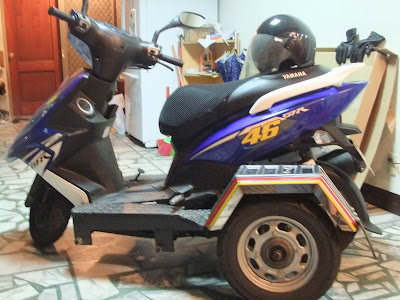Places that I go that require walking long distances or dealing with large crowds are difficult for me. I get tired quickly and after about an hour I’m completely exhausted. Crowds present a different problem because of all the jostling and quick stops I have a tendency to lose balance and fall. It is no fun laying on the ground in a large crowd. People fall over you or trample you. It can be a bit intimidating. So in those types of situations I use a wheelchair. The problem with wheel chairs in my situation, is that because of the Muscular Dystrophy and muscle wasting that comes with that, it’s difficult for me to maneuver or move the chair on some surfaces. I do okay on tile floors or cement sidewalks but carpet and asphalt are more difficult. So I have to depend on the love and care of a relative or friend to move me along.
We have all seen those little electric mobility scooters. They either have three or four wheels and they travel really slowly. These have been great thing for disabled people providing them mobility and access to places they might not otherwise be able to go. The problem with them for me is that they are primarily designed for short trips. I can’t drive a mobility scooter 12 kilometers to Daxi. They’re wonderful for a short trip through the neighborhood, but not for long rides.
When I moved to Taiwan, I discovered an excellent solution to the mobility problem. It travels at roadway speeds. It gives you all the fun and freedom of a regular scooter and allows you complete independence: The Wheelchair Scooter. This is a scooter that is designed to accommodate a wheelchair.
The wheelchair scooter is another modification of a standard scooter. I have a modified scooter, with extra wheels to give me stability to get on and off, but this is a modification that allows you to drive your scooter while remaining in your wheelchair.
Any company that customizes scooters can help you to modify your scooter to accommodate a wheelchair. Actually the scooter dealer can make all of the arrangements and include the modifications in the sale price.
A regular scooter is cut in half. The front wheel and handlebars are placed in front of a box, with a hinged ramp like door. The rear of the bike is then attached to the side of the box. On the other side of the box is another wheel. The result is a type of trike, with the engine and drive wheel on one side along with a passenger seat. The driver sits in his wheelchair safely locked into the box and steer and operates the scooter with his hands. The scooters, as with all scooters are completely hand operated.
The scooter will travel at road speeds, is stable and easy to drive. The only difficulty is parking. It is much too large for a regular scooter parking spot and too small to use a car spot. However, it has been my experience that the police are tolerant of disability scooters parking in places where they wouldn’t allow a regular scooter to park.
 |
| There's room for a passenger on the seat. |
I once parked in a place where a number of scooters were parked only to come back and find all the scooters but mine were towed a way. I think there are two reasons for this one personal and one economic. Police like everyone have compassion and realize that people with disabilities may need to park closer to the building than others. The economic reason is that my disability scooter takes up two places in the towing vehicle. That’s one less impound charge for the towing company.
The following video is by Mordeth 13:
Other posts you may be interested in:
The following video is by Mordeth 13:
Other posts you may be interested in:
Living in Taiwan: Coping with Disability
Traveling with M13: Custom Scooters of Taiwan
Rolling East: Traveling in a Wheelchair
Traveling with M13: Custom Scooters of Taiwan
Rolling East: Traveling in a Wheelchair
Photo credits: http://www.mobilityzone.co.uk/acatalog/Shoprider_Cordoba_Mobility_Scooter.html
Wheel Chair Scooter: (screen capture) Mordeth 13 (M13)
Thanks to M13 for the use of his video, Wheelchair Scooters
All other photos Chris Banducci
Thanks to M13 for the use of his video, Wheelchair Scooters







